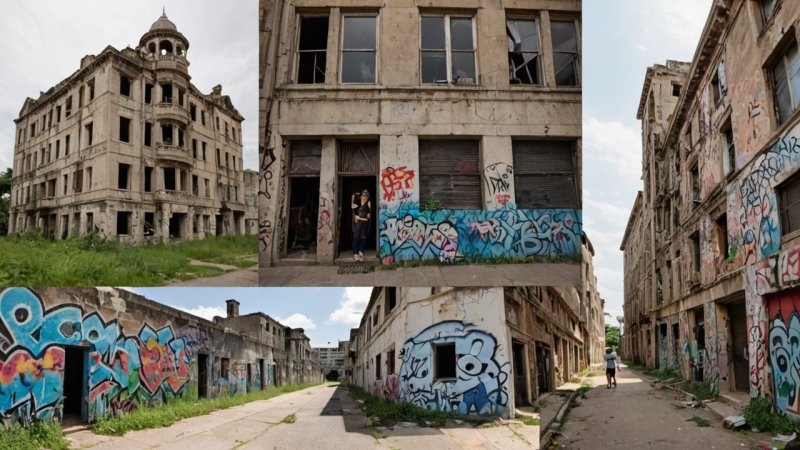As wanderers and explorers, our motivations for traveling can vary greatly. While traditional travel often emphasizes sightseeing and relaxation, urban exploration taps into a deeper psychological need for adventure, discovery, and sometimes, a touch of nostalgia. This article will delve into the key differences, pros, and cons of urban exploration compared to traditional travel, highlighting how each approach satisfies our innate desire to explore the world.
Defining Urban Exploration and Traditional Travel
Urban exploration, often referred to as 'urbex,' involves exploring abandoned structures, hidden places, and off-the-beaten-path locations within urban environments. It’s about uncovering the stories behind forgotten places and experiencing the thrill of adventure in settings that are often overlooked.
Traditional travel, on the other hand, focuses on visiting well-known tourist attractions, indulging in local cuisine, and often includes a more structured itinerary. It seeks to provide an enriching experience through cultural immersion and relaxation.
Psychological Motivations Behind Each Approach
The motivations for urban exploration and traditional travel can be quite different. Urban explorers often seek:
- Adventure and Thrill: The excitement of navigating through unknown territories can be exhilarating.
- Curiosity: There’s a strong desire to discover hidden gems and learn the history behind them.
- Connection to the Past: Exploring abandoned places often evokes feelings of nostalgia and reflection.
Conversely, traditional travelers may be motivated by:
- Relaxation: Many seek a break from routine and the opportunity to unwind.
- Cultural Engagement: Travelers often aim to immerse themselves in the customs, food, and traditions of a new place.
- Social Experiences: Traditional travel often involves meeting new people and making memories with friends or family.
Pros of Urban Exploration
Urban exploration offers several unique advantages:
- Authenticity: Explorers often experience a more genuine side of a city, away from the curated tourist spots.
- Unique Experiences: Many encounters during urban exploration cannot be replicated, from discovering street art to meeting fellow explorers.
- Physical Activity: Urbex often involves hiking, climbing, and navigating through various terrains, promoting physical fitness.
Cons of Urban Exploration
Despite its thrill, urban exploration has its downsides:
- Safety Risks: Abandoned places can pose physical dangers, such as unstable structures and hazardous materials.
- Legal Issues: Accessing private or restricted areas can lead to legal consequences.
- Emotional Impact: Encountering derelict environments may evoke feelings of sadness or loss.
Pros of Traditional Travel
Traditional travel has its own set of benefits:
- Comfort: Many traditional travel experiences prioritize comfort, with accommodations and amenities designed for relaxation.
- Safety and Security: Tourists often feel safer in well-trodden areas with established infrastructure.
- Convenience: Organized tours and itineraries simplify the travel experience, allowing for a more laid-back approach.
Cons of Traditional Travel
However, traditional travel can have its drawbacks:
- Lack of Authenticity: Many tourist destinations can feel commercialized and lack the genuine local experience.
- Overcrowding: Popular attractions often suffer from large crowds, detracting from the overall experience.
- Cost: Traditional travel can sometimes come with a hefty price tag due to the reliance on commercial services.
Comparative Experiences: What Each Offers
When comparing the experiences offered by urban exploration and traditional travel, the contrast is stark:
Interaction with the Environment
Urban explorers often find themselves engaging with the environment in a more profound way. They might document the decay of a once-thriving building or marvel at the intricate details of street art. In contrast, traditional travelers may engage in less hands-on experiences, often observing rather than participating.
Planning and Flexibility
Urban exploration tends to be more spontaneous. Explorers may find themselves wandering into an intriguing alley or deciding to enter a hidden building purely based on curiosity. Traditional travel, however, often requires extensive planning, from booking hotels to scheduling guided tours.
Connection to Community
Urban explorers often connect with local communities through their journeys, discovering hidden gems and sharing stories with locals. Traditional travelers, while they may engage with locals, often do so within a more structured environment, such as restaurants or markets designed for tourists.
Final Thoughts: Which is Right for You?
Choosing between urban exploration and traditional travel ultimately comes down to personal preference and the type of experience you seek. If you’re drawn to adventure, authenticity, and the thrill of discovery, urban exploration may be your calling. However, if you prefer comfort, structure, and a deeper cultural engagement, traditional travel will likely suit you better. Understanding the psychological motivations behind each approach can enhance your travel experiences, allowing you to choose an adventure that resonates with your sense of wanderlust.






